#hostilia
Text
I am like. Just tipsy enough to ramble about my new favourite beloved blorbo because I think about her all the time she literally lives in my head rent free for all of the day I spin her in my head at terminal velocity HOWEVER when I am completely sober I am just. A little too shy to be like ‘listen to me talk about my niche ttrpg OC baby girl’
#hostilia posting#listen I just love her so much your honour she’s so important to me#my weird little baby girl
10 notes
·
View notes
Note
hi! can you please make a list of ancient roman inspired names, including some that are less common/not straight from mainstream mythology? thank you!
— 𝐀𝐍𝐂𝐈𝐄𝐍𝐓 𝐑𝐎𝐌𝐀𝐍 𝐍𝐀𝐌𝐄𝐒
below is a list of ANCIENT ROMAN inspired names. they are in alphabetical order, and split into 'masculine' and 'feminine' and 'unisex', for easier access. please LIKE / REBLOG if you find this list useful!
— 𝐌𝐀𝐒𝐂𝐔𝐋𝐈𝐍𝐄
Accius
Acilius
Acutius
Adiutor
Aedius
Aelianus / Aelius
Aemilianus / Aemilius
Aetius
Africanus / Afranius
Agathus
Agellus
Agricola
Agrippinus
Ahenobarbus
Akylas
Akylinos
Albanos / Albinianus / Albinius / Albinos
Alexinos / Alexinus
Amadias
Amicius / Amicus
Ampliatus
Ancus / Anicius
Annalis
Ansanus
Antoninos
Aphrikanos
Aquillius
Arrius
Arruns / Arruntius
Asper
Attius
Aufidius
Augoustinos / Augoustos
Augur
Aulos
Aurelianos / Aurelios
Aurius
Ausonius
Balbinos
Basolus
Bassianus
Bibulus
Blaesus
Blossius
Bonus
Britannicus
Broutos / Brutus
Caesarion
Calpurnianus
Caninius / Canius
Capito / Capitolinus
Cartilius
Carus
Carvilius
Casca
Castricius
Castus
Catullus
Caudex
Ceionius
Cicerón
Cincinnatus
Cinna
Clateus
Clodius / Cordius
Corellius
Coriolanus
Cornificius
Coropas
Corvus
Cossus / Crassus
Curius / Curtius
Dacianus / Dacius
Damasippus
Damasius
Datius
Decius
Defendens
Dentatus
Diaulus
Diocletius
Dolabella
Drousos / Drusianus
Equitius
Eulalus
Eumachius
Favian / Favonius
Martinos / Martius
Marullus
Maternus / Maturinus
Maxentios / Maximinos
Memmius
Messala
Metellus
Mettius
Minatus
Minervinus / Minervius
Miniatus
Minius
Montanus
Mucius
Munatius
Natalis
Naucratius
Necessitus
Nerius
Neron
Neroua
Nervas
Noma
Novatus / Novius
Numerius
Nymphias
Opimius
Opiter / Opiternius
Oppius
Optimus
Orestinus
Ostorius
Oualentinianos / Oualentinos / Oualerianos / Oualerios
Ouespasianos
Ouiktor
Oursos
Ovius
Paccius
Patrobas
Paulinos / Paullus
Pergentinus
Pertinax
Phabianos / Phabios / Phabrikios
Phaustinos / Phaustos
Phillipus
Phloros
Phourios
Pictor
Plautus
Pompo
Pontios
Poplios
Poppaeus
Portian / Portius
Poublios
Priscillus
Priskos
Probus
Processus
Proculus
Propertius
Pupillus
Quartus
Quintianus
Quiricus
Radix
Regoulos
Romanicus
Romulan / Romulanus
Roscius / Rosius
Rouphinos / Rouphos
Rullianus / Rullius / Rullus
Rupilius
Russus
Rutilius
Sabinos
Salinator
Sallustius
Satorninos / Satourninos
Savinus
Sawiris
Scaurus
Scribonius / Scribonus
Sedulius
Sekoundos
Sempronius
Senekas
Seouerianos / Seouerinos / Seoueros
Seppius
Serenos / Serenus
Sergios
Serouios
Sertor
Servilianus / Servilius
Servios
Severianos / Severinos / Severos
Silius
Sosius
Sporus / Spourios
Statilius
Statius
Sulpicius
Surdinius / Surdinus
Symphorus
Tarkynios
Tenagino
Terentios
Thrax
Tiberinus
Tibullus
Titinius / Titius
Torquatus
Toullios
Trebius
Turpilius
Ulpian
Ummidius
Valentinianos / Valentinos / Valerianos / Valerios
Varro / Varus
Venustian / Venustianus
Verus
Vespasius
Vettius
Vicesimus
Vinitius
Vipsanius
Viridianus / Viridius
Volesus / Volsus
— 𝐅𝐄𝐌𝐈𝐍𝐈𝐍𝐄
Accia
Aconia
Acutia
Adelphasium
Aedia
Afrania / Africana
Aimilia
Akylina
Albinia
Amica
Anicia
Aniensis
Annia
Appia
Aquilia
Arria
Arruntia
Atia
Aufidia
Aula
Aureola
Auria
Avidia / Avita
Blanda
Caenis
Caesillia / Caesula
Caia
Caietana
Capitolina
Cartilia
Carvilia
Cassiana
Castricia
Ceionia
Cordia
Corellia
Cornificia
Crispina
Curia
Cypriana
Dacia
Domitiana
Drusiana
Eumachia
Felicula
Ferocia / Ferocilla / Ferocina
Floridia / Floridiana
Furia
Furnia / Furnilla
Fusca
Fuscinilla
Hostilia
Iaia
Ianouaria
Invidia
Ioulia / Iouliana
Ioulitta
Iuventas
Januaria
Joviana
Kaikilia
Kouinta
Lepida
Licinia
Livilla
Lollia
Loukilla
Loukretia
Lucillia
Luciola
Maecia
Mamerca
Mania
Materna
Maxentia
Maximiana / Maximina
Mercuria
Messalina
Metella
Mettia
Milonia
Mucia
Munatia
Naevia
Necessitas
Neruia
Novia
Octaviana
Opimia
Oppia
Orestilla
Orestina
Oualentina
Oualeria / Oualeriana
Phabia / Phabiana
Phausta / Phaustina
Pompeia / Pompilia
Poppaea
Potita / Potitia
Procula
Pulchra
Quadratilla
Quarta / Quartilla
Quieta
Quinta / Quintia / Quintiana
Quintilia / Quintiliana
Romilia / Romula
Roscia / Rosia
Rupilia
Rutilia
Sagitta
Sallustia
Saturna
Scaura
Scribonia
Sebine
Secunda / Secundilla
Sedulia
Semperbella
Sempronia
Seouera
Sertora
Servilia
Severa / Severiana / Severilla
Statilia
Stellatina
Sulpicia
Surdinia
Sympherusa
Symphora
Tatia
Terentia
Tiberia
Tita / Titia / Titinia
Tuccia
Turia
Ulpia
Ultima
Vipsania
Viridia / Viridiana
Vistilia / Vitalina
Vitellia
Volesa / Volusa / Volusia
— 𝐔𝐍𝐈𝐒𝐄𝐗
Agrippa
Aquila
Glaucia
Iovita
Merula
146 notes
·
View notes
Text
Curia Iulia, vista desde la parte trasera y frontal. Este edificio sufrió innumerables renovaciones tras diversos incendios. La original de época monárquica, llamada Curia Hostilia, fue restaurada por Sila y posteriormente por César que mantuvo la apariencia original.


8 notes
·
View notes
Text
Chapter 8: The Senate of Rome
The senators took their seats in the Curia Hostilia, where the Roman Senate had gathered since the formation of the republic.

Once a plain building of plain stone, the Senate House now boasted a veneer of black marble on its interior walls and risers. Gilded columns painted to imitate stone soared heavenward to support a gilt ceiling that glowed in the light from the high windows on both sides. A wide center aisle led to a large dais on the far end opposite the entrance, where a golden statue of winged victory stood behind the ivory inlaid cerule chair used by the presiding consul.

As the day’s business was light, the presiding consul, Gaius Scribonius Curio, wasted little time in getting to Cicero’s measure, reading it out as Cicero stood. The boni looked on in disdain as he walked down the steps to the central aisle to speak, and my master later told me that, even though he was one of the greatest speakers in Rome, that walk was one of the longest in his life.
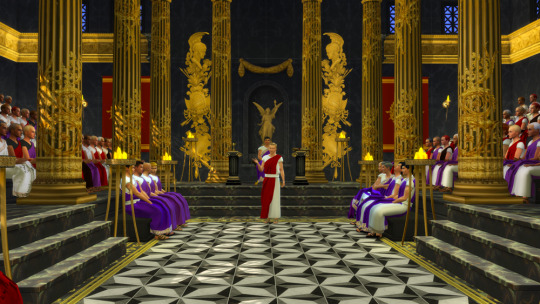
“Conscript Fathers,” Cicero began, respectfully. “This morning, I received an old friend from my time as praetor of Sicily, Sosethius of Thermae. When I knew him, only a year ago, he was a wealthy businessman and a respected member of his community. Indeed, he was such a great friend of Rome that he regularly hosted visiting dignitaries and officials in his homes across Sicily – and I know this because I, myself, was one of them, and was shown great hospitality and kindness.”

“Yet, when he arrived this morning, it was not the Sosethius of memory who came calling, but instead a broken man, in mourning for all he had lost at the hands of a monster who has abused his power and raped Sicily for all he could squeeze from it.”
A few murmurs filled the house as the realization set in as to whom Cicero referenced.
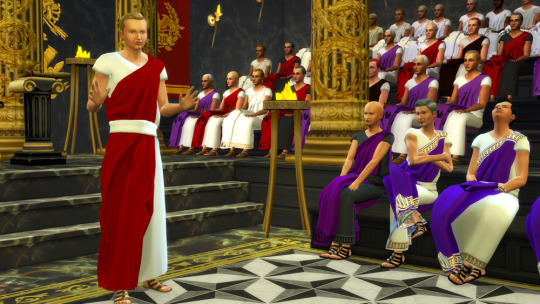
“Not only was Sosethius deprived of his property and livelihood,” Cicero continued, raising his voice slightly, “but he was also charged – unjustly and without proof, to my knowledge – with treason by this same official, in an effort to not only cover the tracks of his abuses, but silence any possibility of Rome discovering his activities.”

“Yet Sosethius managed to reach Rome himself, penniless and hopeless – seeking nothing more than our famed Roman justice,” Cicero said. “Which is the purpose behind the measure I propose today. For if he is tried in abstentia, he will be sentenced to an untimely – and unfair death that will ….”
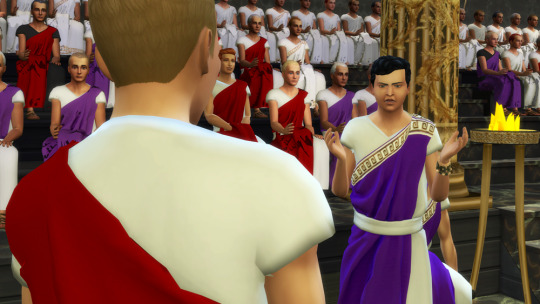
“I believe I will speak now,” Hortensius said, standing. As a senior member of the house and former consul, his claim took precedence, leaving Cicero no choice but to yield the floor.
“I find it fascinating that this young man feels it his place to cast dispersion upon an esteemed member of this House, Gaius Verres, when said member is not present to defend himself,” Hortensius said. “Obviously it is an attempt to villify, once again, any member of the Roman aristocracy by an upstart of low birth!”
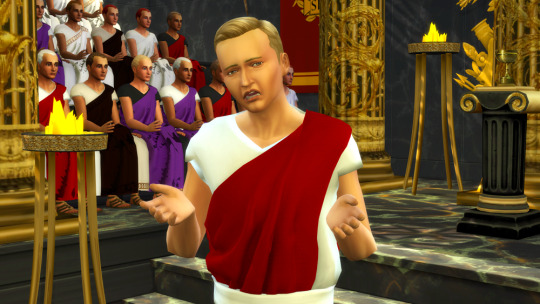
“Oh, but my dear Quintus Hortensius,” Cicero said with a broad smile, “I do not recall ever mentioning the name Gaius Verres! Or is my memory suddenly failing me?”
The junior senators and back benchers roared with laughter and stomped their feet in approval, while the aristocratic boni scowled.

“Yet, since you have brought his name into our discussion, I will not deny that it is he – whom the Senate has entrusted with the role of governor – who has been painted in such a negative light. Yet I completely agree with your objection. He is NOT here to defend himself. But that is precisely my point! I am simply asking that my friend, Sosethius, be granted the same courtesy you now ask for Verres. Or is there to be one standard for aristocrats and another for everyone else?”
The laughter grew louder, and the consul had to raise his voice to quiet the chamber – at which time, Quintus Catulus rose.
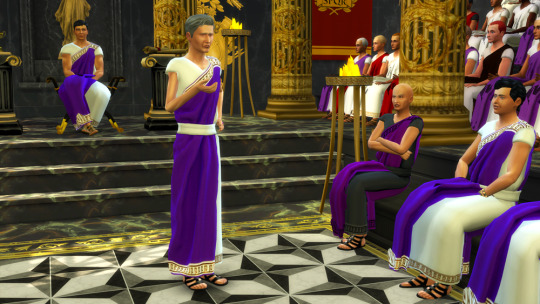
Recognized, he began an attack on Cicero that caused my master to blush with anger. Yet he remained calm, and even managed a smile as he returned to his seat. Obviously, Catulus was attempting to talk out the remainder of the session. Yet Cicero was content, having made his point – and an honest effort to protect his friend from prosecution.
BEGINNING | PREV | NEXT
#ts4 simblr#ts4 story#simblr#Ancient Rome#the Roman Senate#Marcus Tullius Cicero#Gaius Verres#Cicero vs the Boni#launching a career#Chapter 8
13 notes
·
View notes
Text
Kristiflax 2023
Electric Hydra
Soul Grinder
pORq
S.O.R.M
Pile of Death
Earth Messiah
Spend Money On Circus
Devilicious
Scarblade
Hedon
Misery Oath
Kallfront
Black House Hill
Chainsaw Holiday
Anöjd
Soulless
Hostilia
The Royal Beggars
Transport League
Battering Ram
Dun Ringill
Vimmel

View On WordPress
0 notes
Text
O salutaris Hostia,
Quae caeli pandis ostium:
Bella premunt hostilia,
Da robur, fer auxilium.
Uni trinoque Domino
Sit sempiterna gloria,
Qui vitam sine termino
Nobis donet in patria.
Amen.
1 note
·
View note
Photo

View of the upper storey of the Cages for Wild Animals built by the Emperor Domitian, associated with the Flavian Amphitheater and commonly called the Curia Hostilia, from Views of Rome, Giovanni Battista Piranesi, 1750, Art Institute of Chicago: Prints and Drawings
The Charles Deering Collection
Size: 383 x 601 mm (image); 405 x 608 mm (plate); 461 x 674 mm (sheet)
Medium: Etching on heavy ivory laid paper
https://www.artic.edu/artworks/48070/
4 notes
·
View notes
Text
au where Clodius Pulcher’s funeral pyre doesn’t burn down the Curia Hostilia but instead just leaves a big black scorch mark in the marble floor that mysteriously cannot be cleaned. The augurs report that the stain is the judgment of the gods. It becomes a constant reminder to the Senate of Clodius Pulcher’s unjust murder and the popular support for his policies.
#happy may day everybody#ancient rome au#clodius pulcher#this opens up the question of where Caesar would have been murdered if the Curia Hostilia had never been burned down
40 notes
·
View notes
Text
Love realizing I accidentally gave a character some very consistent symbolism because it means I can just lean into it and have a through line through her whole life and the metaphor and symbolism I use around her.
#she’s the runt of the litter. she’s still on her parents leash even though they’re dead. she convinced them to let her save the#runt of the litter of the family dog because maybe then SHE could be kept and saved. her patron saint being a dog saint. the family animal#is the an alien animal resembling a wolf crossed with a deer#she wanted to bite the hands that fed her so bad but they never put their hands close to the bars. at least punishment was attention#in case ur wondering she’s doing fine and is completely 100% normal :)#i can fit so much canine symbolism into this of#hostilia posting
2 notes
·
View notes
Photo
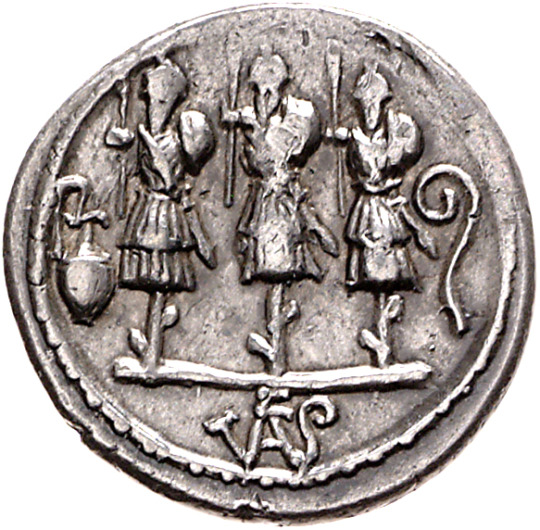
Roman civil war commanders - Faustus Cornelius Sulla
Dictator’s son, Pompeius’ son-in-law and Lucullus’ ward whose career wasn’t that impressive though. In his 20s Faustus was an officer in Pompeius’ army that conquered Syria and Palestine and during that time he admittedly managed to achieve some fame. The brightest moment came during the conquest of Jerusalem when he was among the first men who stormed over the walls of the temple. During the 50s Faustus pursued a political career and was chosen an Augur and Quaestor. While holding the latter office he issued coins celebrating Pompey¨s achievements and above you can see one example (trophies are depicted in the coin)..
When civil war broke out, Faustus joined - quite naturally - Pompey’s side and accompanied his father-in-law into Greece. Apparently he wasn’t among the highest ranking officers of Senatorial army, but in any case he participated in the battle of Pharsalus. After the defeat Faustus fled to Africa with rest of Republican army. They were beaten again at Thapsus and after this setback he tried to escape to Mauretania, but was killed by one of Caesar’s commanders (Publius Sittius).
Summa summarum - rather mediocre career as mentioned earlier. Ok, he was a senator, held a couple of offices and rebuilt Curia Hostilia, but somehow one would have expected more from Sulla’s son and Pompeius son-in-law. Just in comparison Faustus’ cousin Publius Cornelius Sulla had much more succesful career. He held several political offices and also distinguished himself in the civil war as a competent general. For example he commanded the right wing (= famous Xth legion!!) of Caesar’s army at Pharsalus.
https://smb.museum-digital.de/index.php?t=objekt&oges=146529&cachesLoaded=true
Source: Source: Münzkabinett, Staatliche Museen zu Berlin - Stiftung Preußischer Kulturbesitz; Creator: Dirk Sonnenwald ; Copyright Notice;CC BY-NC-SA
#Roman civil war commanders#Sulla's son#gens Cornelia#Roman gens#Roman civil war#1st century BCE#ancient#Roman#coin#Berlin antikensammlung#optimates#Publius Sittius
49 notes
·
View notes
Text
Romance is not dead - but Saturninus is
Once upon a time @catilinas tagged one of my Sullarius posts with these powerful words: “sullarius as a result of stoning saturninus and co to death”. And that inspired me to write this Sullarius fic. So, is it really my fault? I think not. It’s, again, based on Masters of Rome, but it all happens in the alternate timeline of the SWU (Sullarius Written Universe).
Warnings: Saturninus and friends get killed, unrestrained Sullarius
One by one the remaining 15 people of Saturninus’ would-be revolutionists were paraded in front of Gaius Marius in a ironic caricature of a triumph. Saturninus, walking in front, was the only one who not only kept his head high, but also actively looked at Marius. The consul shook his head slightly and Saturninus glared at his former ally. No, said the half of Marius’ face that was still alive, no I will not help you. The last man in the procession was Lucius Equitius, who looked a lot less like the Gracchi now that he wasn’t standing on the rostra. Stripped of the only power he had ever demonstrated, Equitius was now little more than a trickster who had overused his only stunt.
“Well!” exclaimed Marius loudly and startled the men around him. Stretching out his arms as if to embrace the men before him, Marius heaved a huge theatralic sigh.
“Whatever shall I do with you?” he asked, then turned around on his heels to face Scaurus Princeps Senatus who was standing on his left side. “What shall we do with them?” he asked again but a little more quietly this time.
Scaurus took his time, watching the party of young aristocrats that had gathered around the young Metellus and Caepio.
“Looking at these young fools over there, I say we must keep Saturninus and his friends somewhere safe, but also secure. No harm must come to them before they were given proper trials as they are still Romans, but we must also make sure that it’s impossible for the crowd to return and free them.”
Scaurus massaged his temples and suddenly looked very old.
“Saturninus is not even the problem. Imagine the uproar as soon as some foolish woman starts wailing about Lucius Equitius, it’s a tragedy.”
Marius contemplated this, while Sulla shifted nervously from one foot to the other.
“Lucius Cornelius, please tell us what’s on your mind. Your making me giddy with your unrest” said Marius not unkindly. Suddenly in the center of attention, Sulla looked at the two men with uncertainty.
“I was merely listing to your conversation about where to put our dear friends over there and I might have a solution.”
“Then spit it out!” demanded Scaurus who a less patient man than Marius and also did not know Sulla quite as well.
“We put them into the Curia Hostilia” said Sulla and Scaurus froze in shock. After a moment, Marius burst out laughing, earning him anxious looks from Saturninus and his allies and an amused one from Sulla.
“Brilliant!” cried Marius, flinging one arm around Sulla’s shoulders and squeezing him only a little too tightly.
“Brilliant?” echoed Scaurus and looked at them both in disbelief. “You want to keep these..these”- he gestured widely in Saturninus’ general direction-”in the Senate House?”
Releasing Sulla, Marius again focused his attention on the Princeps Senatus.
“Well, so far you have offered me no alternatives. What do you want? Do you want to keep them in our houses? By all means, if you want to spend a few days with Saturninus, I’ll take Equitius. That should be great fun.”
Scaurus grumbled, but knew that he was defeated. He heaved a huge sigh, but his green eyes were alive with something like mirth.
“Fine, then the Curia Hostilia it will be.”
Marius nodded solemnly.
“I will leave the honor to tell our fellow senators of our decision to you, Princeps Senatus” said Marius not without some amusement.
“Oh, curse you, Gaius Marius.”
Scaurus shook his head, but Marius and Sulla could clearly see that he was enjoying the prospect of breaking the news to the likes of Catulus Caesar.
Now standing alone Marius turned around to face Sulla.
“It is a good idea, Lucius Cornelius, and yet I can’t shake off the feeling that you’re planning something.”
Sulla gave Marius a half smile, then looked very directly at the young Metellus and his group of aristocrats. Marius watched him with something like admiration.
“I think I understand” said Marius quietly, then ruffled Sullas hair. “But by all means be careful, Lucius Cornelius. I would hate to see you get convicted for treason.”
Sulla took a pause from rearranging his hair and looked at Marius for a long moment.
“I promise I’ll be careful. Which is why I won’t tell you exactly what I plan, just to be safe.”
Marius nodded, feeling an odd sensation rising in his chest. Wordlessly he reached out and grabbed Sullas shoulders. This time Sulla gave him a real smile before shaking him off.
The morning of the day of the inaugural meeting of the Plebeian Assembly was cool with a light blue sky. Gaius Marius woke up a little earlier than usual and went calmly through his morning routine. When Julia asked him how he expected the day to go, he gave her one of his now sad lopsided smiles.
“I think the day will go very differently than what we all expect.”
Julia looked at him oddly, then again demonstrated that she knew him very well.
“So, you count on Lucius Cornelius to come up with a solution?”
Unwilling to give himself away and betray what he thought he knew about Sulla’s plan, Marius merely shrugged.
“He is an inventive fellow. If he doesn’t come up with something, nobody will.”
“Not even you?” asked Julia softly.
“Oh, I could think of a way, that’s for sure. But Sulla is a true fox. His kind of intelligence is different than mine.”
When Julia motioned for him to explain himself further, Marius could not put his feelings into words.
“I really don’t know, Julia. It is as if he can see ways I would not even think of.”
“Yet you trust him?”
“I do.”
Julia smiled warmly. “Good.”
When Marius and the other leading senators got to the Curia Hostilia they could only watch as the same bunch of young aristocrats that Marius had noticed before was descending ladders down from the roof of the senate building. When the last one of the group had reached the ground, they just stood there a little defiantly with no one trying to escape.
Without exchanging more than a few looks, the senators understood what had happened.
“What shall we do with them?” asked Sulla who had appeared at Marius’ side seemingly from thin air. Marius jumped a little, but quickly regained his composure.
“You’re asking the wrong question, Lucius Cornelius. The right question is: What can we do with them?”
Scaurus made a helpless gesture, seemingly despairing of the situation.
“Our problem has changed, Gaius Marius. As far as I can see, these fools saved us the trouble of trying Saturninus and Lucius Equitius in a public court. But now we have to come up with a suitable strategy to deal with our sorry group over there.”
Marius shook his head slowly, his eyes searching Sulla’s and asking a silent question. Sulla gave him a short wink.
“Well, Princeps Senatus, we have two options, I would say. Either we declare a general amnesty or we bring these young men to court for murder.”
Scaurus hissed.
“To do so would destroy a whole generation of us. No, Gaius Marius, amnesty it must be. Give them a speech on how wrong what they did was and then send them home.”
“I’m sorry but giving speeches is way beyond my simple Italian self. No, I think I will leave this honor to you, Princeps Senatus” said Marius and tried very hard not to laugh.
“Curse you, you plebeian tyrant!” hissed Scaurus and shot both Marius and Sulla one last angry look before he went over to the group of young Romans.
Marius sighed.
“Well, that was that. Now, let’s make sure that our assassins did their work right. You and me will go inside, Lucius Cornelius. The rest stays here.” ordered Marius showing the exact streak of autocracy that Scaurus had just criticized.
Together Marius and Sulla made their way to the Senate House and Marius unlocked the door. Inside lay a battlefield.
The bodies of the would-be revolutionists were scattered all over the room. Where the roof had been striped of its tiles rays of sunshine illuminated the dance of dust giving the building an eerie atmosphere.
The Senate House contained no furniture, no places where someone could hide from projectiles. In their desperation the victims inside had fled to the very edges of the room, but to no avail. Where they did not hit a target, the tiles had crashed on the floor, sending sharp pieces in all directions. Marius spotted Lucius Equitius leaning against a wall, a splinter of tile in his throat. Saturninus himself had not even be given the time to seek shelter; his body lay lifeless almost in the middle of the room.
With a deep sigh Marius bend down to close his eyes, but the eyeballs were so full of dust that the lids would not move. Marius sighed again and looked back at Sulla.
“They were Roman citizens” said Marius slowly.
“They were traitors” answered Sulla and placed himself next to Marius. The Great Man gave his trusty legate a terrible lopsided smile.
“You are right, of course. Thank you, Lucius Cornelius.”
Sulla gave his best impression of confusion.
“I have no idea what you are talking about, Gaius Marius.”
“No” said Marius. “You don’t.”
Once again Marius surveyed the room.
“Well, it looks like we don’t have any survivors to deal with. Only time will tell how the people will react to this. But my instinct tells me that the crowd will not return.”
“I agree” said Sulla and kept his eyes on Saturninus.
And because he did not look at Marius, it came as a total surprise when Marius suddenly pulled him closer by his shoulders and kissed him.
Sulla felt the world close in on him, leaving him only with Gaius Marius and the dead Saturninus. Completely out of his depth Sulla pulled back a little and looked into Marius’ dark eyes. Only now did he notice that his arms had wrapped themselves around Marius’ neck.
“Why did you-” began Sulla quietly but Marius interrupted him.
“Do you really want to talk right now?”
“Right” breathed Sulla and closed the distance between them again. He felt like a completely different person, as if he was watching himself from a distance. Nothing and everything suddenly made sense. He thought of all the august senators waiting outside, of the Piglet who would probably die of shock if he saw him like this and he thought of the bodies littering the room. Sulla did not close his eyes but continued to stare at Saturninus’ open unseeing eyes over Marius’ shoulder.
When they finally separated it seemed as if an eternity had passed. Sulla’s breath was shallow as he looked up at Marius. The general found his composure.
“They are all dead” he said slowly. “Let’s tell that to our friends outside.”
Sulla cleared his throat.
“Yes, let’s do that.”
Later they were sitting in Marius’ study, two glasses of unwatered wine between them on the table.
“So” began Sulla cautiously. “Why did you do it?”
Marius looked up at him as if he had been deep in thought. He tried to keep a calm expression but his eyebrows betrayed him.
“Why did I do what?” he asked weakly. Sulla shot him an exasperated look then turned around to make sure that the door was locked.
“Why did you kiss me?”
A pause. Marius studied Sulla’s face as if he could read the answer there. Then he shrugged helplessly.
“I’m not sure.”
“Haven’t you once told me that you didn’t fancy me?”
“Fancy you” huffed Marius then shook his head. “No, what I told you was that I’m not inclined towards men.”
“I am a man” said Sulla.
“I realize that.”
“So?”
Marius looked at him and Sulla tried to decipher the movements of his eyebrows but this time whatever Marius communicated was lost in translation.
“I’m thinking, give me a moment” said Marius slowly and Sulla leaned back in his chair trying to appear relaxed.
“I’m really not into men. I’ve never been in all my life. With you it’s something different.”
“In what way?”
Marius made direct eye contact and Sulla readied himself for whatever was to come now.
“You and I are the only people in Rome who could destroy this city if we chose to.”
A strange feeling settled in Sulla’s stomach.
“What do you mean?” he asked even though he could guess the answer. He needed to hear it.
Marius smiled one of his sad lopsided smiles.
“You are the only person who is my equal. And that’s why…” Marius visibly fought with himself, then accepted his fate. “That’s why I fancy you, if you want to phrase it like that.”
This is ridiculous, thought Sulla but he was not laughing.
This is madness, thought Sulla but he felt more awake than in a long time.
“I see” he managed to say while he tried grasp the absurdness of the situation. Here he was, Lucius Cornelius Sulla, getting told by Gaius Marius, six times consul of Rome, that what? That he loved him? Was it really that?
Marius took a sip of his wine, then looked at Sulla.
“Well then” began Marius slowly, “why did you do it?”
Sulla was lost in thought and answered with confusion clear on his face.
“Why did I do what?”
Marius smiled warmly. “Why did you kiss me back?”
Sulla stared at him and tried to recall the scene that was oddly blurry in his memory.
“Did I?”
“Oh yes. What kind of person do you think I am? I would not have done it, if I had been under the impression that you were unwilling.”
“So I appeared willing?”
“You did. Weren’t you?”
Now Marius had the audacity to sound worried. Sulla tried to gather his wits.
“No, no. Don’t worry. I...I was willing, if you want to say it like that..”
“Good.”
For Marius that seemed to be enough, so Sulla reached for his glass of wine and took a sip.
He knew that this was a topic that would keep him up at night, but right now he felt not prepared to talk to Marius about it.
“You know what’s the bad thing about all that?” he asked instead.
Marius lifted an enquiring eyebrow. “What?”
“We missed Scaurus’ speech to my young aristocratic friends.”
And Marius laughed.
16 notes
·
View notes
Text
Week #3
We began with a discussion of the combat between the horatii and the curatii. A dual was waged similar to those in epics by heroes such as the illiad’s aeneas. In these duels two champions fight in the center while the opposing armies look on. There is a demonstration of the importance of thought and strategy in these duels. Two romans initially die while all three albans are wounded. The remaining horatii run away which allows the curatii to take them down one by one. Reception studies are a subfield of classics where one investigates how later authors, artists, scholars, and politicians critiqued and adapted previous classical works of the greeks and romans. Some examples of the reception of classics include Bernini’s sculpture Aeneas, Anchises, and Ascanius, as well as David’s The Intervention of the Sabine Women. The Oath of Horatii is a painting depicting the three brothers horatii as they pledge themselves to fight against the three brothers curiatii in a duel to decide the winner of the war between Rome and Alba Longa. Tullus Hostilius moved the people of alba longa to rome and destroyed alba longa, as well as building a new senate house, Curia Hostilia.
2 notes
·
View notes
Text
THE THEATRE OF POMPEY, Pt. 1

Pompey the Great began to build the first permanent theatre in Rome over the years c. 61/55 BC. The construction of the immense theatre coincided with the first triumvirate, the renewal of which at Lucca in 56 BC paved the way for Pompey’s second consulship, with Crassus, in 55 BC and his governorship of Spain.

Almost every aspect of the building--its location, form, scale, function--was determined by political considerations. Pompey himself conceived of the theatre as an never-ending triumph, perpetuating the memory of his brilliant career, as a venue for his political activities, and as a sign of his taste and admiration of Hellenic culture. First and foremost, however, he conceived of the building as a massive bribe designed to buy the support to the common people at a critical moment in a high-stakes power struggle.

The vast complex had a long-term significance as well. It transformed the course of Roman architecture, serving as the architectural model for subsequent theatres and as the patronage model for the large-scale, public commissions undertaken by the emperors.
The theatre of Pompey was an amalgamation of buildings with varied and sometimes interrelated functions. The theatre, or entertainment portion, was modeled on the Hellenistic theatre at Mytilene, which Pompey visited in 62 BC, but executed on a much larger scale. The three-story, 90 meter-wide scenae frons was able to accommodate 600 donkeys trotted on stage simultaneously during the performance of play. Pliny estimated the seating capacity at 40,000, which was dismissed for centuries as exaggeration, but has been confirmed by recent excavations.
As the donkeys suggest, a theatre of this size could accommodate a wider range of entertainments than the typical Greek theatre. Cicero’s account of the open days of the theatre mentions not only recherché Latin and Oscan dramas and dramatic readings by famous retired actors, but athletic competitions and gladiatorial combats as well (venationes several days in length were carried out in the nearby Circus Flaminius). Like the amphiteatre of Pompeii, Pompey’s cavea was shaded by a velarium; The cavea was also cooled by water flowing through channels cut into the stone floor.

The religious component, a small temple of Venus Victrix, to whom Pompey attributed his victories, was placed at the top of the cavea, which served as the temple’s podium and staircase. This arrangement was not unprecedented: the hemicycle temple at the summit of the sanctuary of Fortuna Primagenia in Praeneste (seen below) was approached by a semi-circular staircase which doubled as theatre seating. The temple was completed three years after the opening of the theatre. Several smaller shrines dedicated to Virtue, Felicitas, and Honor were located in the theatre.

Abutting the back of the scenae frons was an immense porticus pone scaenam, the building’s social component. Pompey’s porticus differed considerably from the practical storage facility and shelter later codified by Vitruvius. The Severan Forma Urbis indicates a vast, enclosed, peristyle garden, planted with rows of plane trees interspersed with fountains and pedestal statuary chosen by Titus Pompilius Atticus (which may have included the 6-meter gilded bronze statue of Hercules discovered during excavations in 1865). Additional amenities included a gallery, dedicated to the display of Pompey’s war spoils. The garden quickly became a popular meeting place and a prototype for numerous enclosed parks in Rome. The two long covered pavilions seen in Gismondi’s plastico are not supported by archæological evidence.
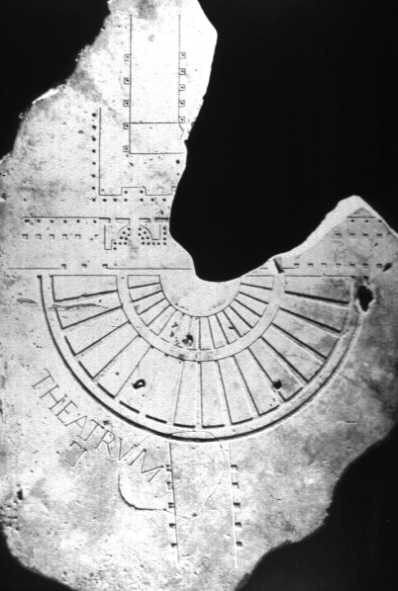

Finally, a curia, or meeting place for the senate, the building’s political component, was built into an exedra at the eastern end of the porticus. It was in the curia pompeia, and not the curia hostilia in the Roman Forum, that Julius Caesar was assassinated in 44 BC. Jean-Léon Gérôme’s painting of Caesar’s assassins (1859/67) recreates the curia as it was understood by 19th-century archæology.
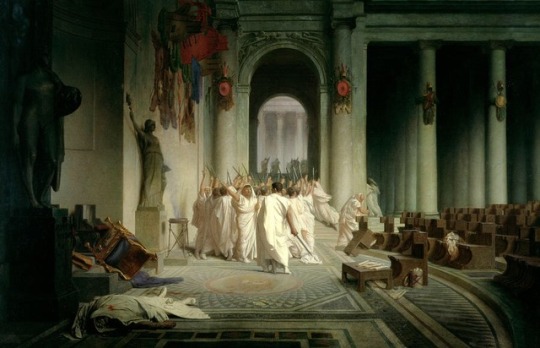
The walls of the theatre and portico were composed of traditional travertine masonry, while the innovative system of vaults and arches that supported the cavea were composed of concrete. The red granite engaged columns and blind arches that made up the three tiers of arcades of the exterior elevation were purely decorative, serving no supporting function. The use of a concrete substructure to support the cavea made it possible for Pompey to choose a location on flat land in the center of Rome.

Covering what s now an entire neighborhood, the theatre of Pompey extended from the Campo de’ Fiori to the Largo Argentina area sacra—a distance of approximately 500 meters. The Flavian Amphitheatre, by contrast, is 189 meters in length. If it were still standing, the theatre would tower over every other structure in the vicinity, including the church of Sant’ Andrea della Valle. The first theatrum lapideum in Rome was the largest theatre ever built in antiquity and the most impressive public building in the city, surpassed in scale only by the Domus Aurea in the next century.
1. Italo Gimondi, Topographical Map of Ancient Rome, Rome, Museo della Civiltà Romana.
2. Victoire Baltard, Section of Theatre of Pompey Cavea,
3. 3D Rendering of the cavea.
4. Reconstruction drawing of the cavea and temple.
5. 3D rendering of the temple of Fortuna at the Sanctuary of Fortuna Primagenia, Praeneste.
6. Severan Forma Urbis, c. AD 205, Rome, Archivio Storico Capitolino.
7. Rodolfo Lanciani, Forma Urbis Romae, Pl. XXI, 1893/1901.
8. Jean-Léon Gérôme, Assassination of Julius Caesar, 1859/67, Baltimore, Walters Art Gallery.
9. Reconstruction drawing, 1915.
10. Google Earth view of area of modern Rome where the theatre was located.

#roman architecture#gnaeus pompeius magnus#porticus pompeianae#roman gardens#julius caesar#classical antiquity#mytilene#rodolfo lanciani
6 notes
·
View notes
Text
O salutaris Hostia, quæ cæli pandis ostium: Bella premunt hostilia, da robur, fer auxilium.Uni trinoque Domino Sit sempiterna gloria, qui vitam sine termino nobis donet in patria. Amen.

#catholic#jesus#católico#jesus cristo#deus#jesus christ#catholic church#catolicismo#igreja católica#catolico#church#igreja#god#christ#cristo
10 notes
·
View notes
Photo
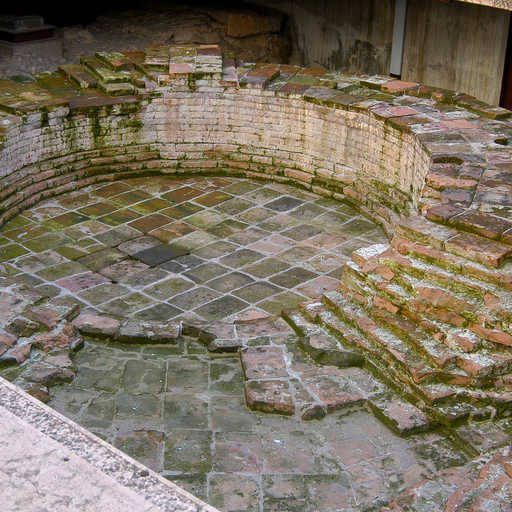
Porta Leoni
Porta Leoni è costituita da due manufatti distinti: tardo repubblicano è quello interno, imperiale è il secondo, separato dal primo di 60-90 centimetri. La porta apriva la città all'ingresso della via che, provenendo da sud, attraverso Hostilia, congiungeva Bologna con Verona. Nel medioevo era chiamata Porta San Fermo e, nel rinascimento, Arco di Valerio. Il nome attuale è d’origine popolare, a ricordo di un coronamento sepolcrale romano che si trovava nelle vicinanze e che portava...
#verona#veronacity#veronaitaly#italy#italia#picoftheday#picsart#insta_verona#instadaily#volgoitalia#volgoveneto#volgoverona#igworldclub#instagood#ig_europa#ig_italia_#igveneto#phototag_it#citybestpics#globe_travel_#worldtravelpics#wonderful_places#beautifuldestinations#worldplaces#beautifulplanet#nakedplanet#earthpix#discoverearth#ExploreItaly
1 note
·
View note